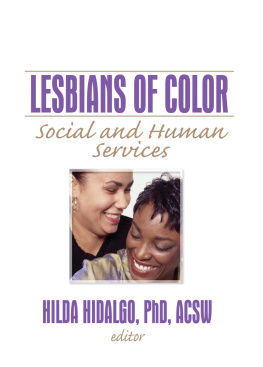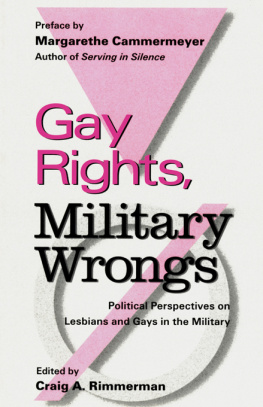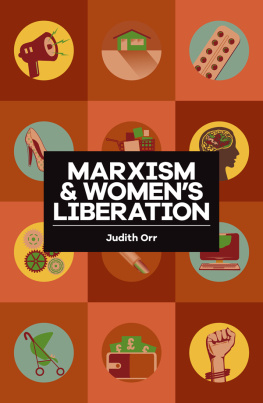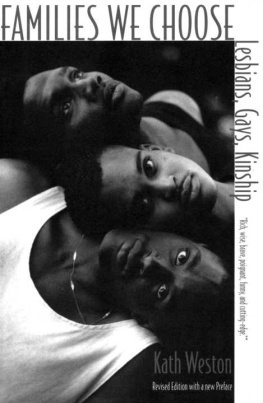Contents

PINK TRIANGLES
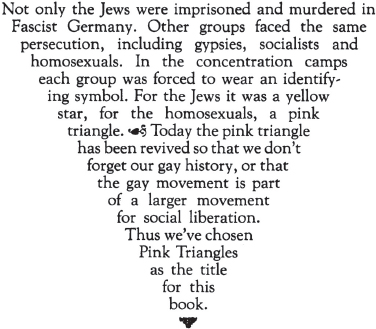

Pink Triangles
Radical Perspectives
on Gay Liberation
edited by Pam Mitchell

This edition published by Verso 2018
First published by Alyson Publications, Inc. 1980
Alyson Publications, Inc. 1980
Why Marxism? Gay Left Collective 1977
Happy Families? Paedophilia Examined and Looking
at Pornography Gay Left Collective 1978
Childhood Sexuality and Paedophilia Gay Left Collective 1979
Gay Left Collective 2018
All rights reserved
The moral rights of the authors have been asserted
1 3 5 7 9 10 8 6 4 2
Verso
UK: 6 Meard Street, London W1F 0EG
US: 20 Jay Street, Suite 1010, Brooklyn, NY 11201
versobooks.com
Verso is the imprint of New Left Books
ISBN-13: 978-1-78873-234-5
ISBN-13: 978-1-78873-235-2 (UK EBK)
ISBN-13: 978-1-78873-236-9 (US EBK)
British Library Cataloguing in Publication Data
A catalogue record for this book is available from the British Library
The Library of Congress Has Cataloged the Previous Edition As Follows:
Card Catalog No,: 80-67090
Mitchell, Pam
Pink Triangles.
Boston, Mass: Alyson Publications, Inc.
Printed in the UK by CPI Group
Contents
The fourteen essays that follow were written by a variety of activists involved in Left politics in general and in gay liberation in particular. They are not meant to represent all views or touch on all issues related to these topics, but to provoke thought about how the two can and must relate to one another. The collection is by no means comprehensive. Contributions by lesbians or gay men of color are notable for their absence. Issues of particular interest to gay men are better represented than are issues of specific concern to lesbians. We expect to publish a sequel to this collection that will include responses to these essays and that will provide a chance to correct these deficiencies. Because the essays were not written specifically for this anthology, they are not uniform in tone some more academic, some more personal and they vary in the extent to which they focus on theoretical issues. But as Judy MacLean notes, to link socialism and lesbianism is to link the unpopular with the taboo; and that shared experience of being double outsiders, gay people on the Left, leads to a common thread of understanding that runs through all the articles in this collection.
It is evident to all the authors that the existence of gay men and lesbians as a group with a culture of our own has political significance, and that our oppression is neither a historical accident nor an isolated case. The essays show that as a group we are in fact oppressed, and that we are oppressed because we are a threat. Reforms gay civil rights, affirmative action for gay men and lesbians will not and cannot be enough to overcome that oppression, although they may make life better for some individuals. Reformism pits our group against other oppressed peoples. At best it puts some of us in positions in which we can actively serve the interests of the class in power. It does nothing to alter the present political and economic system, a system that depends upon competition, hierarchy, the sexual division of labor, and that is therefore needed to oppress us in the first place. In order to overcome gay and lesbian oppression we must first understand why it arose and the functions it now serves in maintaining the status quo. Out of that understanding, and out of the culture and institutions that have already been created and adapted by gay men and lesbians, we must develop strategies and visions for massive social change that gets to the roots of our oppression.
The essays in the first section establish that a gay and lesbian culture (or cultures) does exist, and that the ideas and institutions that we share contain the seeds of our liberation but are also instruments of our own oppression. We cannot simply seek the freedom to perpetuate and expand gay and lesbian lifestyles as they now exist. Charley Shively points out some ways that gays oppress other gays. Christine Riddiough discusses some of the negative aspects of bar culture. The discussions on pornography and paedophilia and lesbian and gay male sexuality look at ways in which we express our sexuality, the most personal aspects of our lives as well as the ones for which we have had to pay most dearly, and show how our behavior often reflects sexist and capitalist ideology. At the same time, however, the authors show that our culture is subversive and potentially revolutionary because we dont conform to the traditional family and have come up with alternatives, because we affirm a sexuality that has nothing to do with reproduction, because we dare to be different, to challenge laws and norms out of a respect for our own needs and values as human beings. We can be proud of what we have and build upon it.
The articles in the section on radical theory and gay liberation share a belief that the experiences of gay men and lesbians uphold the validity of many of the basic tenets of traditional Marxism, but that an expansion of socialist theory is necessary. All the authors have been influenced by the womens liberation movement and its critiques of socialism; and though the interpretations of the interplay between sexism and capitalism, and between the personal and the political, vary from article to article, there is agreement that gay people are in a unique position to contribute to a rethinking and revitalization of socialist theory. To the Marxist-Leninist Los Angeles Research Group, the capitalist bourgeoisie continues to be the only real opponent, while sexism and heterosexism are extensions of capitalist ideology. Gay liberation is a relatively minor issue, albeit a significant one for those directly effected; but more importantly, heterosexism on the Left is indicative of a more pervasive blindness to the significance of the meaning of sex and sexism in capitalist ideology, a blindness that will hold back the Revolution to come. The other authors are not as quick to identify patriarchy as a side effect of capitalism, and the relationship between the two is one of their main topics of discussion.
Because our very existence is inconsistent with the categories of sex and gender that many institutions are built upon, gay men and lesbians have an outsiders view of how the system works as well as some experience with creating alternatives. In the third and final section three activists write about gay people on the Left, both as critics and as builders, and share their own visions of the process of building a new society. In his postscript to an article written in the early 70s, David Fernbach talks about recent experiences that have radically altered his perceptions of what needs to be done. Judy MacLean discusses the needs of individuals within the movement and the ways in which meeting those needs now can contribute to a strategy for greater changes to come. Marc Killingers review article discusses and compares different strategies and visions. His postscript, which sums up his view of where the lavender Left is now and where he sees it heading, is a fitting end to the collection.




